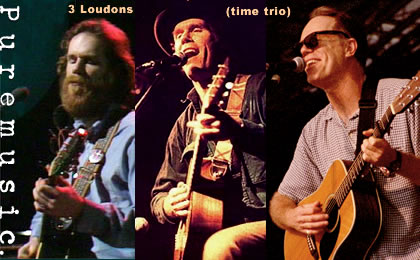
A Conversation with Loudon Wainwright (continued)
LW: Anyway, I've done bits and pieces over the years. And you mentioned Undeclared. I also did an episode of Ally McBeal, playing Dame Edna's boyfriend. That was kind of an acting highlight.
PM: Wow. And that was a biggie, like that was two parts or something.
LW: Yeah, that was a two-hour episode, over two weeks. So the music and the acting, I'm doing both. There are similarities and they both involve performing skills, but they're quite different. There's a lot of waiting in acting. You learn how to sit in a trailer and wait. The music seems to be a bit more immediate. But with acting there's less travel, and that's what I like--I'd rather sit and wait in a trailer in Montgomery, Alabama than be running around airports all week.
PM: It seems to me musicians, especially bluesmen, have traditionally said, "I'll play for free, but you got to pay me for traveling."
LW: Right, right. Yeah, in acting you're paid for waiting, in music you're paid for traveling.
PM: Exactly. I really like the song "Cobwebs" for several reasons.
LW: Uh-huh.
PM: I mean, not only is it a break from the folk groove musically--which, I mean, I like that too--but I appreciate the subject, since we have to remove so many examples of that unmentionable word from absolutely every interview we do.
LW: Yeah, yeah. Well, as I mentioned in the song, I myself misuse the word constantly. But when I hear it--
PM: How did it ever come to be?
LW: I don't know. The song explores it a bit, I suppose. I think it was my generation, with the Jack Kerouac-like wild man beatnik thing, that might have--
PM: Oh, it was the beatnik thing, right, "like, crazy daddy-o."
LW: Right. Well, that's why I mentioned Maynard G. Krebs. I think that might have been the beginnings of it, people in the 50s and 60s who gave it a kind of hip cache.
PM: [laughs]
LW: But now it's just interwoven into the culture. I mean, every time my daughter says it, I want to do this [makes buzzer noise], make the buzzer noise and penalize her. But then she--the lower lip starts to tremble, so I back off. But I say the word myself, so--
PM: I mean, it's really not unusual, literally, to take about 100 of them out of any given interview.
LW: Yeah. Well, it's insidious. It's like mold or mildew or something. It really has peppered the language, and infected it, in a sense. That song originally appeared on a record called Grown Man. I made it in '94. So the situation hasn't improved. I mean, like mold and mildew, it's spreading.
PM: It's progressive, right.
LW: Yeah.
PM: We tend to think that our interview subjects are uniquely revealed when speaking of their cohorts. What incredible accompanists you have on this record.
LW: Yeah. I don't know if the liner notes were sent along with this--
PM: I tracked them down.
LW: Oh, good. Because I live in L.A. now, although you can reach me out here on Long Island. And I have some great buddies there who--well, David Mansfield has played on most of the records I've been making for the last 12 years.
PM: Where did you two first meet?
LW: I met David at the Edmonton Folk Festival, it must have been 1990, maybe. And then we did a television show together, which was a great show, which is sadly no longer--I think it was called Night Stages. It was on NBC late at night. David Sanborn was the host.
PM: Oh, that was a great show, the Sanborn show. He mixed people of different genres.
LW: Yeah. And that was the first time David Mansield--I called up David and asked him to come play with me on that. So that would have been '90 or '91. And then I've been using him on records ever since. But he was in L.A. working on a movie, scoring this movie with T-Bone Burnett, the Ya Ya Sisterhood movie.
And then Richard Thompson lives in L.A., at least part of the time, as does Van Dyke Parks. Both of those guys are friends. So I was just lucky to call at the right time, that they were around and came down and played.
PM: I mean, it's just an amazing trio of guys, all three monsters. And you and Richard go back quite a ways. He produced how many of your records?
LW: Well, he co-produced two in the mid 80s, I'm All Right and More Love Songs. And then he's played on a couple of others. So we go back. I think I met Richard at the end of the '70s, probably. And so we have a long, checkered relationship.
PM: He's one of my very favorite musicians anywhere, anytime. What kind of a guy is he, like off-stage? Maybe you'd share something with us about him that only a friend of his would know.
LW: He is such a pain in the ass off-stage.
PM: [laughs] continue
print (pdf) listen to clips archives puremusic home